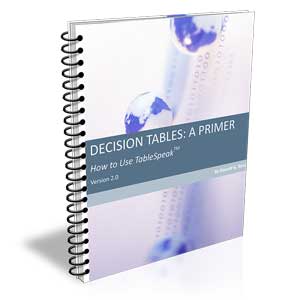Blueprinting Business Knowledge: Concept Models
Extracted from Business Knowledge Blueprints: Enabling Your Data to Speak the Language of the Business, by Ronald G. Ross, 2020.
Businesses today face a host of challenges that demand a new approach, not just to data but to the business knowledge that lies behind data. Perhaps the driving force is poor data quality. Or IT's disconnect from the language the business uses. Or lack of a big picture or common vocabulary. Maybe all the above.
Recognition is growing rapidly that traditional data design techniques are also inadequate for the larger challenges of integrated digital business, including highly-customized products, machine intelligence, and software ontologies.
The common factor in meeting these challenges? It's what the company knows — business knowledge. That knowledge isn't limited to structured data — it applies equally to textual business communications ('unstructured data'). How did structured data and 'unstructured data' ever get disconnected? Business text matters!
Business knowledge is more complicated — I prefer to say far richer — than most realize. It requires a blueprint, which must be developed deliberately through clarification and synthesis. The goal is to create a shared, structured understanding of concepts.
What is a concept? The dictionary[1] defines it simply as something conceived in the mind — a thought, idea, notion. For business what's critical is whether a concept is shared.
People usually already have concepts of things in their minds — you typically don't design concepts from scratch. The problem is that those concepts aren't shaped the same. And they're not harmonized. Think of the problem as essentially redesigning concepts to get everyone on the same page — that is, to create shared understanding.
By providing essential structure for the design, a concept model is the core component of the business knowledge blueprint you need. A concept model provides the basis for creating a robust business vocabulary with business-friendly definitions. We define concept model as follows:
concept model: a set of concepts structured according to the relations among them
A concept model should be primarily of, by, and for business people. To emphasize the point, perhaps we should say business concept model. Even when we drop business from the term and say just concept model, remember business is always implicit.
References
[1] Merriam-Webster Unabridged.
# # #
About our Contributor:
Online Interactive Training Series
In response to a great many requests, Business Rule Solutions now offers at-a-distance learning options. No travel, no backlogs, no hassles. Same great instructors, but with schedules, content and pricing designed to meet the special needs of busy professionals.












How to Define Business Terms in Plain English: A Primer
How to Use DecisionSpeak™ and Question Charts (Q-Charts™)
Decision Tables - A Primer: How to Use TableSpeak™
Tabulation of Lists in RuleSpeak®: A Primer - Using "The Following" Clause
Business Agility Manifesto
Business Rules Manifesto
Business Motivation Model
Decision Vocabulary
[Download]
[Download]
Semantics of Business Vocabulary and Business Rules